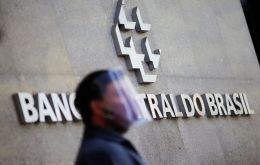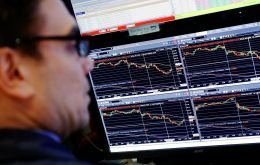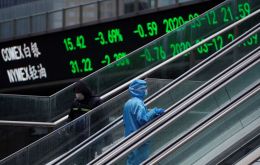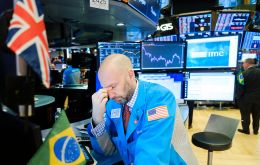MercoPress. South Atlantic News Agency
Tag: markets
-
Thursday, September 23rd 2021 - 09:29 UTC
Relief in world markets, China's mega Evergrande will pay some of its debts

China's largest real estate group, Evergrande and on the brink of bankruptcy announced on Wednesday an agreement with a creditor to avoid the nonpayment of a bond that matured this Thursday. In a release to the Shenzhen stock exchange, its affiliate announced it had reached a plan to pay the bond's interests, (not capital) and of which markets feared the worst.
-
Thursday, September 23rd 2021 - 09:01 UTC
Brazil increases Selic interest rate to 6,25%, the highest in two years

As expected the Brazilian central bank on Wednesday increased a whole percentage point of its basic Selic interest rate to 6,25%, the fifth in a row and the highest in two years. The Monetary Policy Committee, Copon unanimously voted for the increase in an attempt to contain inflation.
-
Tuesday, September 21st 2021 - 08:50 UTC
Chinese giant Evergrande's debt spreads fears among world markets

As the Chinese Evergrande Group falls into debt some regards as an encore of the Lehman Brothers crisis of 2008, markets around the globe have begun to brace for the worst despite little signs of encouragement in the opposing sense.
-
Thursday, April 2nd 2020 - 07:36 UTC
Mitigating impacts of Covid-19 on food trade and markets

The following is the statement by FAO's chief Qu Donguy, WHO's Tedros Adhanom Ghebreyseus and WTO's director-general Roberto Azevedo.
-
Wednesday, April 1st 2020 - 07:45 UTC
Wall Street markets tumbled on Tuesday: Dow with its biggest quarterly decline since 1987

Wall Street’s three major indexes tumbled on Tuesday, with the Dow registering its biggest quarterly decline since 1987 and the S&P 500 suffering its deepest quarterly drop since the financial crisis on growing evidence of massive economic damage from the coronavirus pandemic.
-
Friday, March 27th 2020 - 08:21 UTC
Norway's sovereign fund has lost US$ 124 billion because of the pandemic markets collapse

Norway's sovereign wealth fund, the world's largest, has lost 1.33 trillion Norwegian crowns (US$124 billion) so far this year as stock markets have plunged due to the coronavirus pandemic, it said on Thursday.
-
Monday, March 16th 2020 - 11:19 UTC
G7 global rescue: Fed cuts rates to almost zero and launches US$ 700bn stimulus program

The US has cut interest rates to almost zero and launched a US$ 700bn stimulus program in a bid to protect the economy from the effect of coronavirus. It is part of a coordinated action announced on Sunday in the UK, Japan, the Eurozone, Canada, and Switzerland.
-
Friday, March 13th 2020 - 08:57 UTC
Coronavirus panic in markets wipes US$ 14 trillion in a month

Global stock markets crashed on Friday, ending a years-long bull run, with coronavirus panic selling hitting almost every asset class and leaving investors nowhere to hide. Half a trillion dollars in liquidity from the U.S. Federal Reserve and the promise of more were not enough to calm the fear that has wiped some US$14 trillion from world stocks in a month.
-
Friday, January 31st 2020 - 08:25 UTC
Coronavirus and current account deficit hit the Brazilian Real against the dollar

Brazil’s currency the Real hit a two-month low against the dollar on Thursday, slumping to within sight of its record low under a wave of global risk aversion on fears over the coronavirus outbreak and its diminishing yield appeal.
-
Thursday, January 9th 2020 - 09:49 UTC
Brazil after other markets if US and China agree on farm deal, mainly soybeans

Brazil could lose some recent gains it made in the global soy market during the US-China trade war if those two countries reach a deal to end their dispute, a Brazilian Agriculture Ministry official said on Wednesday.
